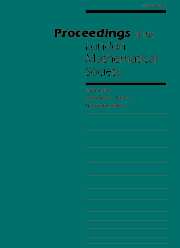Article contents
Projection methods for discrete Schrödinger operators
Published online by Cambridge University Press: 08 March 2004
Abstract
Let $H$ be the discrete Schrödinger operator
$$Hu(n):=u(n-1)+u(n+1)+v(n)u(n),\quad u(0)=0$$
acting on $l^2 (\mathbb{Z}^+)$, where the potential $v$ is real-valued and $v(n) \to 0$ as $n \to \infty$. Let <formula form="inline" disc="math" id="frm007"><formtex notation="AMSTeX">$P$ be the orthogonal projection onto a closed linear subspace $\Lambda \subset l^2 (\mathbb{Z}^+)$. In a recent paper E. B. Davies defines the second order spectrum ${\rm Spec}_2(H, \Lambda)$ of $H$ relative to $\Lambda$ as the set of $z \in \mathbb{C}$ such that the restriction to $\Lambda$ of the operator $P(H - z)^2P$ is not invertible within the space $\Lambda$. The purpose of this article is to investigate properties of ${\rm Spec}_2(H, \Lambda)$ when $\Lambda$ is large but finite dimensional. We explore in particular the connection between this set and the spectrum of $H$. Our main result provides sharp bounds in terms of the potential $v$ for the asymptotic behaviour of ${\rm Spec}_2(H, \Lambda)$ as $\Lambda$ increases towards $l^2(\mathbb{Z}^+)$.
Keywords
- Type
- Research Article
- Information
- Copyright
- 2004 London Mathematical Society
- 3
- Cited by


